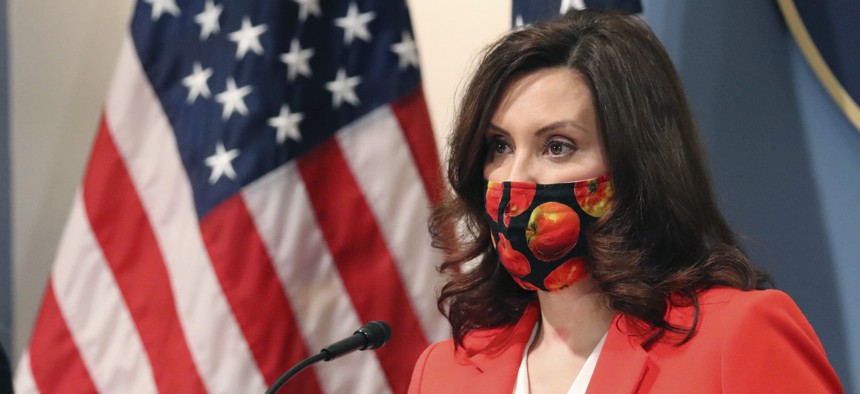No Extra Vaccines for Hot Spot States, White House Says

In this Feb. 24, 2021, file photo provided by the Michigan Office of the Governor, Gov. Gretchen Whitmer addresses the state during a speech in Lansing, Mich. Michigan Office of the Governor via AP
Michigan Gov. Gretchen Whitmer had requested a boost in Covid-19 vaccines to help combat a rising number of infections in her state.
The White House will not send additional doses of coronavirus vaccines to states experiencing a surge in infections, as Michigan officials recently requested, Biden administration officials said Monday.
Michigan should instead “shut things down” to slow the spread of the virus, said Rochelle Walensky, director of the Centers for Disease Control and Prevention, during a press conference.
Covid-19 infections began to surge again in Michigan this month, with the rate of new infections in the state now the highest in the nation, the Detroit News reported. More than 45,000 new cases and 282 deaths reported over the last week.
Amid the uptick in cases, Gov. Gretchen Whitmer asked the Biden administration last week for an increase in the state’s allotment of Covid-19 vaccine doses. The federal government has been allocating vaccine doses based on state population.
“Right now our numbers are alarming, and we all have a role to play to get our state moving in the right direction again,” the Democratic governor said during a press conference last week. “That’s why I’m renewing my call on the federal government to surge additional vaccines to our state.”
Federal officials said Monday they are sending additional resources to Michigan, such as therapeutic treatments, personnel to help administer vaccines, and equipment for additional testing capacity.
But sending more vaccine doses to Michigan or other states when they experience a surge would require decreasing shipments to others. Because of the length of time it takes the vaccine to become effective at preventing infection, sending more doses to hot spots would be akin to playing a game of “whack-a-mole,” said Andy Slavitt, the White House senior advisor on the Covid-19 response.
Even if more shots went in the arms of Michigan residents today, the state wouldn’t see the effects of vaccine protection for another two to six weeks, Walensky said.
“If we tried to vaccinate our way out of what is happening in Michigan, we would be disappointed that it took so long for the vaccine to work,” Walensky said.
When President Biden took office in January, he boosted weekly shipments of vaccines to states and began providing them better estimates detailing the number of vaccines in the pipeline to help local health officials prepare. States have worked to quickly expand vaccination capacity since December and some are already offering the vaccine to all residents ages 16 and older. More than 72 million peopleare fully vaccinated, and 78% of people over age 65 have had at least one shot, Slavitt said.
But variant strains of Covid-19 have led to infection spikes in Michigan and elsewhere.
To crack down on the spread, Walensky said states with infection hot spots should rely on the type of closures and restrictions originally enacted to help contain the virus spread.
“When you have an acute situation with an extraordinary number of cases like we have in Michigan, the answer is not necessary to give vaccine,” she said. “The answer is to really close things down to go back to our basics.”
Whitmer heeded that warning Monday, extending for six months restrictions that force office workers to continue to work remotely when possible.
"At this juncture, with our high-positivity numbers, it's really important to extend for another six months so that we have the ability to work through what these protocols look like and get people back into the workplace when it's safe to do so," Whitmer said during a press conference.
Andrea Noble is a staff correspondent with Route Fifty.
NEXT STORY: Need a COVID-19 Vaccine? Visit Your Local Transit Center





